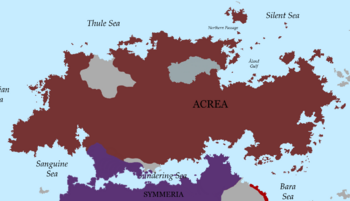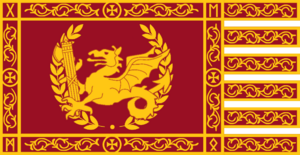Acrean Empire
Acrean Empire Norðreyjar Norðurkeisarreyjar Caesarregnum Aquilonaris | |
|---|---|
| 284 BCE–1016 CEa 1330 CEb | |
 The traditional territory of the Acrean Empire | |
| Capital | Rena |
| Common languages | Elder Nordic Elder Venetian |
| Religion | Valstígr |
| Demonym(s) | Acrean |
| Government | Absolute Monarchy |
| Keisari (Elder Nordic) Caesar (Elder Venetian) | |
| Historical era | Antiquity to Medieval |
• Established | 284 BCE |
• Dissolved | 1016 CEa 1330 CEb |
| Currency | Mark |
| Today part of | Avallon |
| |
The Acrean Empire, also called the Empire of Acre, was ancient empire in Eracura. Originally a confederation of allied city states and their territories called the Acrean League and grew to become an empire which dominated the continent for nearly a millennium. The Empire served as the home of the Nordic peoples, today one of the largest ethnic groups in the Tyran. The Acrean Empire reached its territorial peak ca. 500 CE, when its territory spanned from coast to coast across the Eracuran continent and had spread into northern Siduri, though is considered to have been at its relative zenith from 100 BCE to 300 CE.
Since early antiquity, the territory of modern day Acrea had long been dominated by a collection of powerful city states, primarily led by five: Rena, Ravenna, Arcanea, Trier, and Coria. Collectively these city-states were known as the Pentarchy, and controlled a majority of trade and extensive territory throughout Acrea. Tensions with the expanding Sabrian Empire led these city-states to form the Acrean League under the combined leadership of Rena and Ravenna, whose united polity was known as Acre in honour of the ancient metropolis from which the city of Rena grew. The Acrean League emerged victorious in the ensuing First Acrean-Sabrian War under the war leadership of Generals Valarys Aurelius of Ravenna and Vithmirax Aelarssen of Rena. Alongside the material and geopolitical benefits the League realised with its victory, the experience of uniting against the Sabrians and the common experience of the war transformed political and social dynamics amongst the various polities which made up the League. As a result, in 284 BCE, Aurelius called a Consilium Regni in Ravenna to propose uniting all of the League into single rule, and supported Vithmirax as its head. History records some descent initially, but ultimately the three-week long assembly ended in agreement and Vithrimax was named Keisari of the new Acrean state.
The Acrean Empire gradually expanded over the next few centuries. It first conquered southeastern Eracura from the Sabrians during the Second Acrean-Sabrian War, often being aided by local rulers who allied with the Acreans over their former Sabrian governors, though nearly as many remained loyal to the Sabrians. The Nordic peoples of modern-day Nordkrusen and Delkora joined the Acreans by agreement after being offered automatic citizenship. Acrea's westward expansion was slow and deliberate, marked by extensive construction projects which accompanied armies west to establish roads and infrastructure.
Etymology
The name "Acrea" is derived from the ancient name for the city of Rena, called Acre. The origin of the city's ancient name is unclear, however it is referenced in writing as early as 1040 BCE. The use of the term "Acrean" to describe the confederation of city states is contemporary; it was deliberately chosen by leaders of the era to invoke the importance of the ancient metropolis in commerce and communication amongst all peoples of the territory that came to be known as Acrea.
The more common native official words used to describe Acrea, Norðreyjar and Caesarregnum Aquilonaris, originated after the establishment of the Acrean Empire and refer to the country's geography relative to other major nations. They were significantly influenced by Acrea's standing relative to the established Sabrian Empire and the newly founded Symmerian Empire, the latter of which became known to the Acreans through the influx of Kydonians who settled in Venetia during the Kydonian Migration and came to dominate the nobility of the city of Arcanea.
Norðreyjar is a shortened form of Norðurkeisarreyjar, meaning "Northern Empire". The Nordic name was similarly adopted by the latin-speaking peoples of southern Acrea as Caesarregnum Aquilonaris. Use of these terms became more common in both official and colloquial speech as a measure of inclusiveness due to the integration of non-Acrean peoples as citizens of the Empire in its early period, so as not to alienate these populations and ensure their successful integration.
